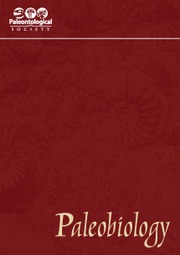No CrossRef data available.
Article contents
The question of spiral axes and brachiopod shell growth: a comparison of morphometric techniques
Published online by Cambridge University Press: 20 May 2016
Abstract
An example of actual shell growth in the pentameride brachiopod Lycophoria nucella (Dalman) reveals that the axis-computing morphometric technique (Aldridge 1998; Van Osselaer and Grosjean 2000) produces hypothetical ideal logarithmic spirals that fail to morphometrically characterize the biological realities determined by the actual geometry of the shells to which the axis-computing technique is applied. In contrast, the actual-outline morphometric technique (McGhee 1980) links the measurement coordinate system directly to the ontogeny of the animal under analysis, and it yields morphometric parameterizations of geometric aspects of the shell of direct biological significance to the animal (the presence or absence of ontogenetic alterations in shell convexity, rates of change of shell convexity in the case of anisometric growth, and the nature of anisometric changes in shell convexity—i.e., whether the shell becomes increasingly more convex with growth, or whether the shell becomes increasingly flatter with growth).
- Type
- Articles
- Information
- Copyright
- Copyright © The Paleontological Society


